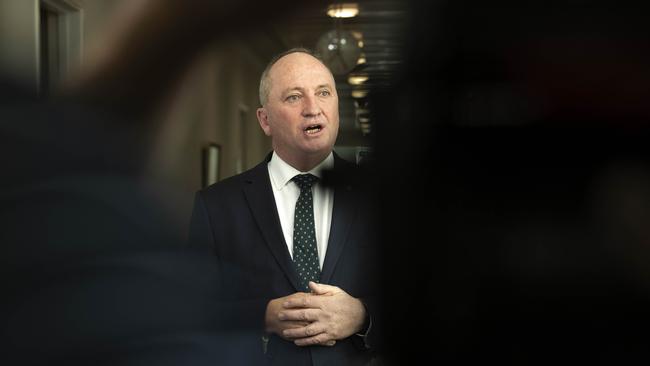Politicians are taxpayers’ employees, and we have a right to minimise liability
Politicians are taxpayers’ employees, and we have a right to minimise liability.

Then, of course, you add the travel element; many nights away from home, and the need to work late, into the wee hours, surrounded by young and often adoring staff. Should we be surprised that things go bump in the night, or indeed all night, and if they do is it any of our business?
The answer to this question is: that depends. It is all about who picks up the tab. The taxpayer is the employer here, and when things go wrong we bear the cost. Specifically, if any claims arise as a result of any alleged damage done, the expense can be significant.
This is why Malcolm Turnbull was right to implement the “bonk ban” for ministers years ago. This is why Labor was right to adopt it recently and extend it to all members. Politicians shouldn’t sleep with staff, and we shouldn’t be insisting they have the right to do so.
Even the name the rule has been given makes light of an issue, perhaps as way to discredit and mock. We can make this a chapter in the culture wars. We can argue about journalistic standards, lament invasions of privacy, accuse media outfits of smears and pontificate about issues of privacy and freedom. What we can’t do is escape workplace relations reality; ironically, the laws that politicians themselves have given us, with all their complexities and constraints.
Relationships in the workplace are an issue of workplace relations risk. And all employers, especially taxpayers, have the right to manage risk. The best way to do this is to insist on certain standards. This minimises liability and places boundaries on costs.
To an old hand like me, the culture of our national parliament jumps out, to put it kindly, as a work in progress.
Individuals are mostly protected (although sometimes not) by symbiotic relationships with media types. There are so many secrets that could be told but aren’t. And behind this great wall of privilege our political workplaces are perhaps decades behind mid-size and large employers in the private sector in their practices.
Politicians make the rules, they just are not that good at following them. In the private sector, relationships with staff are frowned on. They often require disclosure and registration, and sometimes are absolutely prohibited.
This has nothing to do with a new form of piety, it has to do with liability. Where there is a risk of commercial sensitivity because of blackmail risk or just plain old media interest, the issue requires careful management.
Where there is evidence of a power imbalance between the parties, concern is heightened. Consenting partners can fall out; the junior member can come back later, with lawyers in tow, and make claims of harassment or even rape.
For an obvious example, think of the various football codes. In recent years they have been forced by media exposure, consumer trends and societal expectations to temper player behaviour and promote a wholesome image.
Clubs have had to invest heavily; to emphasise the role of player spouses and families, include them in events and travel, formally educate everyone on respectful relationships, and work on elevating women into senior roles.
The people who have helped the football codes transform themselves should come to Canberra and work their magic. I joke about that, but not about this; regrettably, there are some members of parliament — male, female, neither; straight, gay, flexible; left, right, oscillating — who view the place as their personal orchard, loaded with juicy apples, ready to be picked. Of course, consenting adults should do whatever they want in private and the rest of us should mind our own business. People can have the best intentions, but their appetites still can bring them undone, and that problem is theirs to manage.
Then there is the reality that many people meet their future spouses at work. And, of course, those without sin should cast the first stone. Human frailty, as Scott Morrison has put it, is part of life.
Still, there is a line and we shouldn’t let our employees cross it. Any politician who feels compelled to sleep with their staff could start their own business, employ workers, sleep with them and bear the liability.
Alternatively, in their own time they could have affairs with members of the public who don’t work for them, using after-tax wages to buy the drinks and pay for the hotel, and then it truly is a private matter. As well, they can join dating sites and pursue hook-ups in their own time, at their own expense.
What they can’t do is take advantage of the spoils of office, then leave a trail of destruction in their wake and expect us to clean up the mess.
Politicians have passed laws to make employers liable for almost anything that goes wrong in the workplace. When relationships at work go wrong, as they often do, it is the employer that picks up the tab, and the employer, in this situation, is us.



Trips to Canberra don’t happen terribly often, but occasionally I walk the halls of Parliament House. This cloistered work environment presents as all-consuming, fuelled with adrenalin and loaded with incidental benefits for the few.